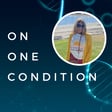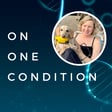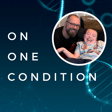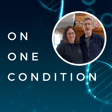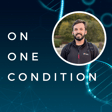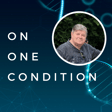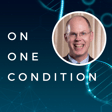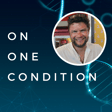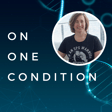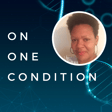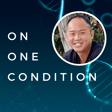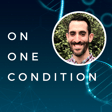Become a Creator today!Start creating today - Share your story with the world!
Start for free
00:00:00
00:00:01

Episode 31: David Hogan - Cowden Syndrome
David had confirmation of his diagnosis of Cowden Syndrome after his mum passed away with the same condition. David talks about isolation after being diagnosed, and the urge he felt to do something for the rare disease community. He now leads a group open to all men with rare disease, focused on mental health. Through this, he provides a platform for men to open up, or listen to others.
The song David chose is Dream Baby Dream by Bruce Springsteen.
Recommended
Transcript
Introduction to 'On One Condition' Podcast
00:00:01
Speaker
Hi, I'm Sylvain Biotro, and you're listening to On One Condition, a podcast to raise awareness about health conditions by listening to people who live them every day. My guest today is David Hogan, and we're going to talk about Carden Syndrome. Hi, David. How are you doing? Hi. Thanks for inviting me onto the podcast.
00:00:23
Speaker
Well, thank you for joining me. I love starting with a song, as everyone who listens regularly knows. So what song did you choose and why? Yeah, I decided to choose a song called, called Dream Baby Dream, which was a cover that Bruce Springsteen did of a band called Suicide in the late 70s.
00:00:52
Speaker
Great band to cover a song from and a great song. It gives me hope. It gives me strength. It was a song that I played to my mum when she was in hospital. She had the same rare disease as me and she loved it as well. So it has many different meanings to me. Nice. I don't know the song, so I'll make sure to listen to it after this.
00:01:17
Speaker
Well, that leads me to my first question.
Understanding Cowden Syndrome
00:01:19
Speaker
Actually, you mentioned that your mum had Cowton syndrome as well. So is it an inherited condition? It's a condition that can be inherited by people. So it does run in a lot of families that have a condition. But nowadays, what with the advances in science, it is being picked up as a de novo mutation.
00:01:47
Speaker
which I'm not an expert on explaining that, but yeah, basically the child would have it, but it wouldn't come from the parents. I think it skips, it skips generational too, but yes, you know, it is, well, there's more children that have it kind of not for their parents. It's probably, I wouldn't say 50-50, but it's probably more, yeah, it's a bit of both really, I would say now.
00:02:16
Speaker
Yeah. How did you find out that you have the condition? I say how I found out started with a letter from my mother. She was diagnosed with a condition in her fifties after she had thyroid cancer. And the year before she passed, she gave me this letter to give to the doctor should I want to get tested. Her words were
00:02:44
Speaker
It's up to you. I think you have it, but you don't have to get tested. She's felt it's something that I think you shouldn't at least know and make that choice. So it wasn't, well, at the time, there was no obvious symptoms from what I knew and I appeared to be okay, feel okay.
00:03:08
Speaker
But it wasn't until she passed. I thought, yeah, it's something I better find out more about and get tested. So about a year after she passed, I went to get tested, found to have the condition. And I think at that time I wasn't, I was still grieving my mother. So there was a lot of emotions and feelings going on and sense of isolation combined with that. I think I was dealing with this all on my own.
00:03:36
Speaker
I have a daughter, so I got her tested. Fortunately, she doesn't have it. But that's how I found out I have Cowden syndrome. Okay.
Cancer Risks and Cowden Syndrome
00:03:47
Speaker
And is your mother's, you mentioned thyroid cancer, is that at all related to Cowden? Yes. So Cowden's comes with an increased risk of getting certain cancers, thyroid cancer being one of them, breast cancer for women,
00:04:06
Speaker
kidney and colon cancer. It also comes with benign growths, direct mental delays and autism. So that's kind of what the condition comes with. I mean, some people suffer for a bit quite badly, like my mother did. Others, there's a few of us that kind of, you know, touch words, you know, I have a full-time job a day job.
00:04:32
Speaker
not impacted by as severely as others was certainly at this moment in my life. I'm quite fortunate in comparison. So do you get regular checks? Yes, so for the cancers, I have regular checks, which are kind of like really important in terms of obviously getting on top of any possible cancers.
00:04:56
Speaker
So those regular checks hopefully would detect anything early on. Did you say autism as well?
Autism and Regional Guidelines
00:05:07
Speaker
Autism as well, yeah. Do you have any idea what the link is between the increased risk of certain cancers and autism? I'm not quite sure on that one. Maybe it's due to the developmental delays. I'm not sure really.
00:05:25
Speaker
So in the USA, the guidelines for my disease, autism comes under the guidelines, whether in Europe it doesn't. I think there isn't a complete answer to that one, as far as I know, partly because of different countries' views on kind of the condition and how to treat it.
00:05:47
Speaker
Yeah, it's a rare disease. So there must not be that much information about it. Is it quite well documented? It's starting to get slowly better, but there's still not enough information. Yeah. There's not enough in my view. Yeah, there's not enough kind of like research being done still. Yeah. And kind of like trials, it's difficult to get patients in trials because, yeah, location, they have patient's health.
00:06:18
Speaker
Yeah, for a number of reasons, we're not where we would hopefully obviously like to be with my condition. And yourself, have you been assessed for autism?
Clinical Trials and Cognitive Improvements
00:06:31
Speaker
Well, in this country, the health care, so I live in the UK and the health care is NHS. It's kind of good, but it's kind of like basic in some respects, not as detailed as perhaps other countries.
00:06:47
Speaker
I'm on the waiting list to be assessed. Possibly, I've been told, but there's like a long wait here for that kind of assessment. I can see where, I've actually been on a clinical trial in Boston. And yeah, I was told, yeah, through the trial, I was told that, yeah, you're on the spectrum somewhere, but that's obviously only research, that's not a diagnosis.
00:07:15
Speaker
Yeah, it's a long process. I know my daughter was diagnosed many years ago and I think it was better at the time, but still it was a long process already there. It's frustrating, isn't it? Yeah. You mentioned the clinical trial. I'm quite interested to learn a bit more. Is it something you can share about? Yeah, definitely. It was a trial I took part in 2018, 2019.
00:07:45
Speaker
And it was to do with a new drug that would help with the working memory processing speed, the cognitive ability of my relative community. And it was over in Boston at the Children's Hospital. And I remember at the time it was like, I felt like I wanted to do something really positive for the community and get something out of it for myself, obviously. It was hard because
00:08:15
Speaker
It was something new, I'd never been to the USA at that point. Yeah. But yeah, the trial, neuro-site tests, quite a bit of that, kind of looking at that sort of side. I finished the trial, the results showed an improvement for me, but the trial hasn't been FDA approved because of the results. I think it kind of came into COVID at the end of the trial
00:08:45
Speaker
results were kind of conclusive as to whether it could be approved. Okay. But yeah, it was certainly something I really was proud and really like felt was important to take part of. Yeah, yeah, that's very good. And especially flying over to the US for it, which shows to your point earlier that it's difficult to find patients with a specific rare condition.
00:09:16
Speaker
And unfortunately, not everyone like you can can make a trip like this to take part in your trial. So it's very good. Exactly. Yeah, thank you. Yeah. And one of the things I like to quickly add about the trial was there was one doctor there who I still keep in contact now about any questions I may or may not have around my condition. And I think that's really good that kind of you have someone in the medical community that
00:09:44
Speaker
you know, what generally cares and goes out of his way a little bit for me, appreciated the fact that I part the trial. And it's almost someone in the background there to help from a professional, from the professional side of my rare disease. So I just want a quick shout out to him, Dr. Sid.
00:10:05
Speaker
Actually, so you mentioned at the very beginning that you felt isolated when you found out that you have Cowden syndrome.
Building a Supportive Community
00:10:16
Speaker
How do you feel now? Is that isolation gone or is it still there because it's a rare disease or have you found a community to talk to? I feel it's better now for a number of reasons. I feel
00:10:33
Speaker
no particular order. Firstly, I feel I've got a few, not so much a community for my rare disease, but a few people that have the same condition and kind of maybe one or two of them friends or good contacts, who I think are always keeping the contacts. Yeah. And secondly, building a or creating a community for men with rare diseases has given me something
00:11:02
Speaker
hope will be long, long, long term, long term lasting, there's a few many other same rare diseases me. So you're doing something positive. And there's a support there, you know, or I support them. But the odd times I throw out a few questions, and they support me back. So and, and frankly, lastly, having my partner, she lives in the USA, and she has the same rare diseases me. So it's kind of like,
00:11:31
Speaker
No I don't at all because I've kind of built a life around my rare disease and yeah I'm kind of like things are kind of as good as they can be I suppose. Yeah.
00:11:45
Speaker
Do you think it's important to embrace it? As far as I understand and as far as you're concerned, it seems like it's not necessarily impacting you from a physical point of view, but you mentioned men's mental health, which we're going to come back to in a bit. But it sounds like having people around you who have the same condition is important, is that?
00:12:15
Speaker
Correct. Yeah, definitely. I feel for me, I'm not defined by my readisease, you know, other things beside that. But I think, you know, when I was diagnosed with my readisease about a year, maybe after that, I went to a rare disease, UK event, the rare disease that helps as a parliament. And I met a guy who said, if you can accept you have a rare condition, that's half the battle.
00:12:44
Speaker
and whatever that means for the individual. I think that's really important. You don't have to always be doing advocacy, but I think, yeah, that acceptance, whatever the severity of your conditioning is really important.
00:13:00
Speaker
That's a very good point. I'm glad you mentioned that. So going back to what you said, so you've built or you've put together a group focusing on mental health for men with rare disease. Yes. What is it called? It's called a group rare disease, male mental health. Well, it's kind of like meetings.
00:13:30
Speaker
and instead of a group, so rare disease, male mental health meetings. So I set that up in, at the start of lockdown, I thought, where is my space in this scene? I wanted to do more, but I didn't want to do anything that anyone else was copying, because I think kind of, that doesn't serve the community well, and that detracts what someone else is doing. And I felt that I felt, well,
00:13:59
Speaker
What can I do? And it came to me that since my diagnosis, there were loads of amazing females, whether that be patients or female care was talking about rare diseases. But there weren't any men, really. They were full or two, but mostly not. And I kind of felt, yeah, in the conversations I'm having with men, they were like suffering in silence, being afraid to speak out about what they were going through. So I thought, why not kind of set up something for men, make it inclusive to
00:14:29
Speaker
where these male patients and caregivers around the world have meetings where we could just get together, talk about what we're going through, share our experiences, or just listen. I think there's something powerful. You said about listening to other people's stories. So it's been going over three years, men from six continents. I think we've had one guy from Peru speaking Spanish and me trying to work out Google Translate.
00:14:59
Speaker
that was unprepared, but really good. Yeah, some men from all around the world. And it's kind of like, yeah, there's, there's cultural differences. But overall, I think the power of being impacted is a rare disease is something we have in common. I think we have more in common than what divides us, different countries, cultures, classes. And you know, it is hard for a number of reasons to get guys to the group, they're busy, they have families,
00:15:25
Speaker
or they're just not comfortable coming on the same. I still think there's something amazing about it when we get together and amazing about kind of like, yeah, I'm glad I've had that idea that was kind of, I felt more or less original and needed for the community. Yeah. How big is the group now? The group is regular meetings are like between five and 15 people.
00:15:53
Speaker
I have found since lockdown kind of coming to an end, it's not as many people. I think people are getting on with their lives a bit more, which I understand, or people are fed up with Zoom calls. I think a number of things, but it's still there. It's still going and it's hard to still keep it relevant, but it's still needed, I think. Yeah.
Men's Mental Health and Rare Diseases
00:16:18
Speaker
Why do you think men suffer in silence?
00:16:22
Speaker
I think a number of reasons I still think, I think we talk about mental health now, but without actually, particularly men, and some men talk about their mental health. I think there's still a stigma, there's still a feeling of shame, not being heard, vulnerable. Also think, some men are generally busy and don't make the time. I think that's an issue. But also I think with that,
00:16:50
Speaker
It's a catch 22. If you don't make the time for your mental health, it's going to catch up with you. I think mental health needs to be treated a bit like exercise where you need to make time for it. It's good for you to kind of make time for it and stop and pause. And I think kind of like, yeah, I still think that kind of breaking those habits and maybe those traditions around men is something that we still need a lot of work on and focus.
00:17:21
Speaker
So I think it's still an ongoing thing. It just needs to keep working at it really.
00:17:28
Speaker
Yeah, it's interesting because you're completely right that men still, there's still a stigma around men having to be strong. But I feel like the stigma is within the men community rather than being something that's imposed from women. And I don't like doing generalities or anything.
00:17:52
Speaker
But there's so much openness about mental health nowadays, about not necessarily having to be strong all the time. And from what I see, men don't seem to embrace that. Do you agree with that? Yeah, yes, I do actually. I think men do kind of like, they'd rather talk about sports or they'd rather like indulge in
00:18:20
Speaker
banter, rather than kind of like, or in some cases getting frustrated, aggressive, maybe, rather than kind of open up about what they're going through. Yes, I think that's a good point, actually, yeah. The male thing, really.
00:18:40
Speaker
Yeah, that's true. You said something, I can't remember exactly how you said it, but the more you work on your mental health, the easier it gets. But it's a bit the same between men until you start actually having deep conversations. It's almost taboo. You don't know how to get into those conversations.
00:19:03
Speaker
But once you start going into deeper conversations, actually talking about yourself, how you feel, then it gets easier and easier and it gets part of the norm. But it's great for you to stop talking about, stop trying to have fun or having banter and being a bit deeper that I'm sure would make us all feel better. Yeah, that's so true, actually. Yeah.
00:19:31
Speaker
If you're not able to have those deeper conversations with someone that makes it harder to take care of mental health, yeah. So what do you talk about in those meetings? So we would talk about a number of things really related to the mental health side of living with a rare disease. So that could be being a rare caregiver, being a rare patient, trying to get help
00:19:59
Speaker
with the medical system, which at times can be challenging when you have a rare disease. Relationships, how it impacts being a rare son or a romantic partner's bereavement, we've talked about that. We also have, I like inviting male speakers in the community to kind of like give their perspective, share their views, experience, story. So a number of things really, challenges around
00:20:27
Speaker
working with a job as well. I think that's one that's been brought up. Yeah, filling that space with stuff that's important to the guys. And you find that there's a lot of things impact their life slightly differently than someone, well, a man who doesn't have a rare disease. Yeah. And you mentioned medical care, how much like how difficult it is to get medical care when you have a rare disease. Can you share a bit more about that? I think
00:20:56
Speaker
One of the challenges is around being listened to and getting the right support that you need. I would say that that's something that's come up. Other things around kind of medication and the cost of medication, whether in the USA, whether that's through insurance or not, that's still not straightforward. Or we recently had a guy come on from Africa and he come from a low income, but he has to pay for his medication.
00:21:27
Speaker
never straightforward as I've said. Is medication more expensive to treat rare diseases? Yeah, definitely. Like I had a caregiver come on and he mentioned the cost of his child's medication. I think like for my drug that I was on at the trial in Boston, it was 28,000 a month. That's in dollars. So yeah, it's a lot. I think even
00:21:55
Speaker
Regardless of your income, for most people, it's a lot of money. Yeah, definitely.
Joining the Men's Rare Disease Group
00:22:02
Speaker
How can people find the group? So we have monthly meetings on Zoom, twice monthly now. So if you email men's rare disease, mh at gmail.com. If you're interested in coming to the meetings, that's how you can get hold of me. Or I'm on LinkedIn as Dave Hogan.
00:22:24
Speaker
and Instagram, Men's Rare Disease, MH. You can message me on those two platforms as well. Okay. How do you manage to get different time zones aligned? Does that work easily or not? It is hard and I probably say I exclude people from the east of the world because it's at 4pm and 5pm, the two meetings a month.
00:22:54
Speaker
Having said that, I'm doing a rare disease day meeting for people in the East, 7am. I'm going to have to get up my time. It is a little difficult, but the people that regularly come are from Europe and the USA. So that's kind of the main reason why we're on those time zones, but I'm willing to try new things. And this meeting for rare disease day next Thursday, we'll maybe bring in one or two new people.
00:23:22
Speaker
Well, that's amazing. I always admire people like you who get out of their way to find something to do to help the community. It's needed. And I always think the healthcare system should provide more. But at the same time, I'm starting to think more and more that
00:23:46
Speaker
there's also a place for the community because the healthcare system can only focus on certain parts. So it's great that you're providing something different and I love it that you're focusing on mental health for men because I completely agree with you that it's needed. Don't do enough of it. Yeah, definitely. Thank you. Yeah.
00:24:13
Speaker
Which leads me to my last question, which I love asking everyone that comes on the podcast.
David's Happy Places
00:24:19
Speaker
What's your happy place, a place where you feel at peace? Well, I'd have to currently choose two because my partner lives in USA. So that firstly would be New Mexico where she lives. That's my first happy place. I'm currently spending time there, more or less half the year at the moment.
00:24:41
Speaker
And secondly, in the UK, that's a tough one. There's a few more places to choose, but I'd have to say my kind of nearest local city, Chichester. It's just such a lovely city. It's not a big city. There's a lot there to do and say, and it's just a beautiful, lovely place where I feel happy as well.
00:25:05
Speaker
Nice. It's good to have two happy places. Lucky, I suppose. Yes. Well, David, thank you so much for taking the time and again for what you're doing in the rare disease community. That's amazing. Thanks a lot. Thank you, Sylvain. It's a pleasure to be invited and it's been great to talk to you today.
